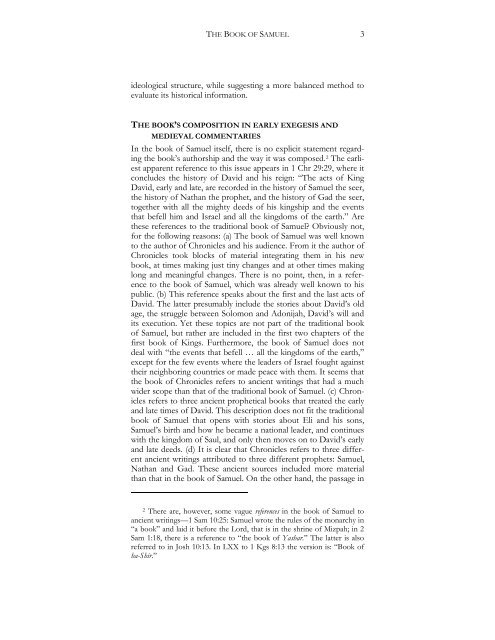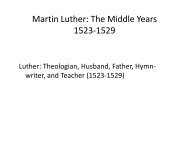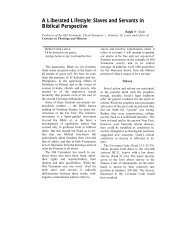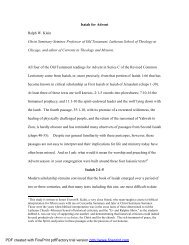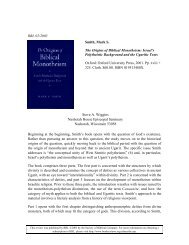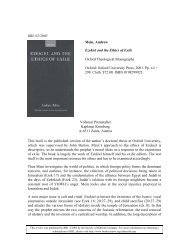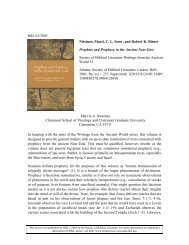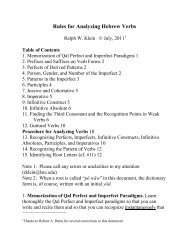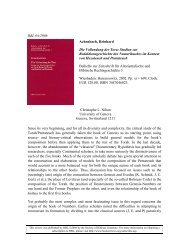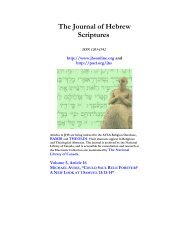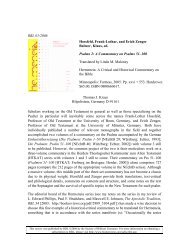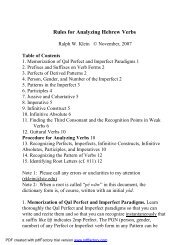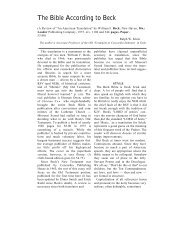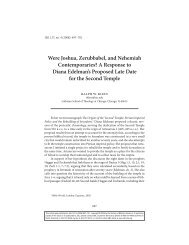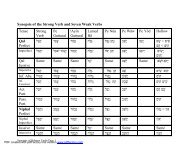The Book of Samuel: Its Composition, Structure and Significance as ...
The Book of Samuel: Its Composition, Structure and Significance as ...
The Book of Samuel: Its Composition, Structure and Significance as ...
You also want an ePaper? Increase the reach of your titles
YUMPU automatically turns print PDFs into web optimized ePapers that Google loves.
THE BOOK OF SAMUEL<br />
ideological structure, while suggesting a more balanced method to<br />
evaluate its historical information.<br />
THE BOOK’S COMPOSITION IN EARLY EXEGESIS AND<br />
MEDIEVAL COMMENTARIES<br />
In the book <strong>of</strong> <strong>Samuel</strong> itself, there is no explicit statement regarding<br />
the book’s authorship <strong>and</strong> the way it w<strong>as</strong> composed. 2 <strong>The</strong> earliest<br />
apparent reference to this issue appears in 1 Chr 29:29, where it<br />
concludes the history <strong>of</strong> David <strong>and</strong> his reign: “<strong>The</strong> acts <strong>of</strong> King<br />
David, early <strong>and</strong> late, are recorded in the history <strong>of</strong> <strong>Samuel</strong> the seer,<br />
the history <strong>of</strong> Nathan the prophet, <strong>and</strong> the history <strong>of</strong> Gad the seer,<br />
together with all the mighty deeds <strong>of</strong> his kingship <strong>and</strong> the events<br />
that befell him <strong>and</strong> Israel <strong>and</strong> all the kingdoms <strong>of</strong> the earth.” Are<br />
these references to the traditional book <strong>of</strong> <strong>Samuel</strong>? Obviously not,<br />
for the following re<strong>as</strong>ons: (a) <strong>The</strong> book <strong>of</strong> <strong>Samuel</strong> w<strong>as</strong> well known<br />
to the author <strong>of</strong> Chronicles <strong>and</strong> his audience. From it the author <strong>of</strong><br />
Chronicles took blocks <strong>of</strong> material integrating them in his new<br />
book, at times making just tiny changes <strong>and</strong> at other times making<br />
long <strong>and</strong> meaningful changes. <strong>The</strong>re is no point, then, in a reference<br />
to the book <strong>of</strong> <strong>Samuel</strong>, which w<strong>as</strong> already well known to his<br />
public. (b) This reference speaks about the first <strong>and</strong> the l<strong>as</strong>t acts <strong>of</strong><br />
David. <strong>The</strong> latter presumably include the stories about David’s old<br />
age, the struggle between Solomon <strong>and</strong> Adonijah, David’s will <strong>and</strong><br />
its execution. Yet these topics are not part <strong>of</strong> the traditional book<br />
<strong>of</strong> <strong>Samuel</strong>, but rather are included in the first two chapters <strong>of</strong> the<br />
first book <strong>of</strong> Kings. Furthermore, the book <strong>of</strong> <strong>Samuel</strong> does not<br />
deal with “the events that befell … all the kingdoms <strong>of</strong> the earth,”<br />
except for the few events where the leaders <strong>of</strong> Israel fought against<br />
their neighboring countries or made peace with them. It seems that<br />
the book <strong>of</strong> Chronicles refers to ancient writings that had a much<br />
wider scope than that <strong>of</strong> the traditional book <strong>of</strong> <strong>Samuel</strong>. (c) Chronicles<br />
refers to three ancient prophetical books that treated the early<br />
<strong>and</strong> late times <strong>of</strong> David. This description does not fit the traditional<br />
book <strong>of</strong> <strong>Samuel</strong> that opens with stories about Eli <strong>and</strong> his sons,<br />
<strong>Samuel</strong>’s birth <strong>and</strong> how he became a national leader, <strong>and</strong> continues<br />
with the kingdom <strong>of</strong> Saul, <strong>and</strong> only then moves on to David’s early<br />
<strong>and</strong> late deeds. (d) It is clear that Chronicles refers to three different<br />
ancient writings attributed to three different prophets: <strong>Samuel</strong>,<br />
Nathan <strong>and</strong> Gad. <strong>The</strong>se ancient sources included more material<br />
than that in the book <strong>of</strong> <strong>Samuel</strong>. On the other h<strong>and</strong>, the p<strong>as</strong>sage in<br />
2 <strong>The</strong>re are, however, some vague references in the book <strong>of</strong> <strong>Samuel</strong> to<br />
ancient writings—1 Sam 10:25: <strong>Samuel</strong> wrote the rules <strong>of</strong> the monarchy in<br />
“a book” <strong>and</strong> laid it before the Lord, that is in the shrine <strong>of</strong> Mizpah; in 2<br />
Sam 1:18, there is a reference to “the book <strong>of</strong> Y<strong>as</strong>har.” <strong>The</strong> latter is also<br />
referred to in Josh 10:13. In LXX to 1 Kgs 8:13 the version is: “<strong>Book</strong> <strong>of</strong><br />
ha-Shir.”<br />
3


